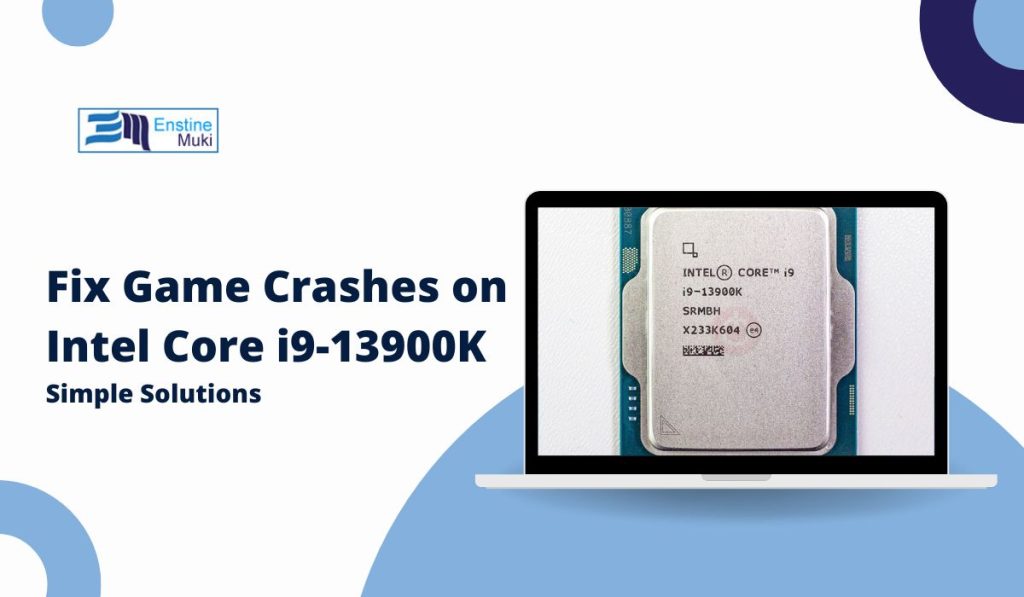Common Causes of Game Crashes on Intel Core i9-13900K
If your games keep crashing or returning to the desktop, there may be one or more reasons behind the issue:
- Overheating: High-performance CPUs like the i9-13900K can generate significant heat, especially under load.
- Driver Issues: Outdated or incompatible drivers can cause instability and lead to crashes.
- Memory Instability: Incorrect or unstable RAM settings may create system instability.
- Power Supply Problems: The i9-13900K’s power demands can strain the power supply, especially with a powerful GPU.
- Software Conflicts: Certain background applications may interfere with game performance.
- Overclocking Instability: Overclocking, if not properly configured, can make the system unstable.
Now, let’s go through each of these possible issues and how to fix them.
Steps to Fix Games Keep Crashing or Exiting to Desktop on Intel Core i9-13900K
1. Monitoring and Managing CPU Temperature
High CPU temperatures can cause games to crash. If your CPU overheats, it may automatically reduce its speed or even shut down to prevent damage.
Steps to Monitor and Manage CPU Temperature:
- Monitor Temperatures: Use tools like HWMonitor or Core Temp to keep track of your CPU temperature.
- Improve Cooling:
- Check that the CPU cooler is properly installed.
- Clean out dust from fans and vents for better airflow.
- Upgrade to a high-performance air or liquid cooler if needed.
Aim to keep your CPU temperature below 85°C during gaming. Proper cooling can prevent crashes due to overheating.
2. Updating GPU and CPU Drivers
Outdated or incompatible drivers can be a common cause of crashes. Keeping both your GPU and CPU drivers up to date can improve system stability.
Steps to Update Drivers:
- For GPU:
- Open NVIDIA GeForce Experience or AMD Radeon Software.
- Check for updates and install the latest drivers.
- For CPU:
- Visit Intel’s official website and download any available updates for the i9-13900K.
Updating drivers ensures that your system can handle the latest games and reduces the risk of crashes due to compatibility issues.
3. Verifying and Adjusting RAM Settings
Incorrect RAM settings can lead to instability, especially if your RAM is overclocked or using a high-frequency profile.
Steps to Check and Adjust RAM Settings:
- Enter your computer’s BIOS by pressing a designated key (usually F2 or Delete) during startup.
- In the BIOS, ensure that the RAM speed matches the manufacturer’s specifications.
- If you’re using an XMP profile, consider disabling it or lowering the frequency.
You can also run MemTest86 to check for memory errors. Stable RAM settings can make a noticeable difference in system stability.
4. Ensuring the Power Supply Meets System Requirements
The Intel Core i9-13900K, paired with a high-end GPU, can draw a lot of power. If the power supply is underpowered, it may struggle to keep up, causing crashes or system reboots.
Steps to Check Power Supply Capacity:
- Verify the wattage of your power supply unit (PSU). For a setup with the i9-13900K and a powerful GPU, a 750W PSU or higher is recommended.
- If your PSU wattage is lower than recommended, consider upgrading to avoid power-related crashes.
A strong power supply can ensure stable performance and prevent unexpected crashes during gaming.
5. Adjusting or Disabling Third-Party Software
Some third-party applications can interfere with game performance. Programs like antivirus software, VPNs, and overlays can impact gaming stability.
Steps to Manage Third-Party Software:
- Antivirus: Make sure Fortnite and Epic Games Launcher are whitelisted in your antivirus settings.
- Background Apps: Temporarily close or disable unnecessary background apps, including screen recorders and overlays.
- VPNs: If you use a VPN, try disabling it, as VPNs can sometimes interfere with gaming connections.
Disabling unnecessary software during gaming sessions can improve stability and reduce the chances of crashes.
6. Disabling or Tuning Overclocking Settings
Overclocking the CPU or GPU can boost performance, but it can also cause instability if not configured correctly.
Steps to Adjust Overclocking Settings:
- Enter the BIOS and disable any overclocking settings on the CPU.
- If you want to overclock, increase settings gradually and use stress-testing tools like Prime95 or Cinebench to verify stability.
- For GPU overclocking, use tools like MSI Afterburner to adjust settings slowly and check for stability.
If you continue to experience crashes, running your system at stock settings may be a more stable option.
7. Additional Troubleshooting Tips for Persistent Crashes
If your games are still crashing, here are some additional troubleshooting tips:
- Lower In-Game Settings: Reducing graphics settings can reduce CPU and GPU load, potentially solving crashes.
- Run Games in Compatibility Mode: For older games, compatibility mode can sometimes improve stability.
- Reinstall the Game: A fresh installation can replace corrupted game files that may be causing issues.
These general troubleshooting steps can help if other solutions haven’t worked.
Q: Does the Intel Core i9-13900K need special cooling for gaming?
A: Yes, high-performance coolers (air or liquid) are recommended, especially if you’re gaming at high settings or overclocking.
Q: How much power does the i9-13900K require with a high-end GPU?
A: A PSU with at least 750W is typically recommended, especially if paired with a powerful GPU.
Q: What settings should I check in BIOS for gaming stability?
A: Ensure RAM frequency matches specifications, and disable unnecessary overclocking for maximum stability.
For further assistance, visit Intel’s support page or relevant forums for user discussions and solutions.
Conclusion
The Intel Core i9-13900K is a powerful processor, but crashes during gaming can occur if the system isn’t optimized. By managing CPU temperatures, updating drivers, checking RAM settings, and handling power requirements, you can often prevent crashes and enjoy a smoother gaming experience.
Did these tips help you? Let us know in the comments or subscribe for more troubleshooting guides and gaming tips!

